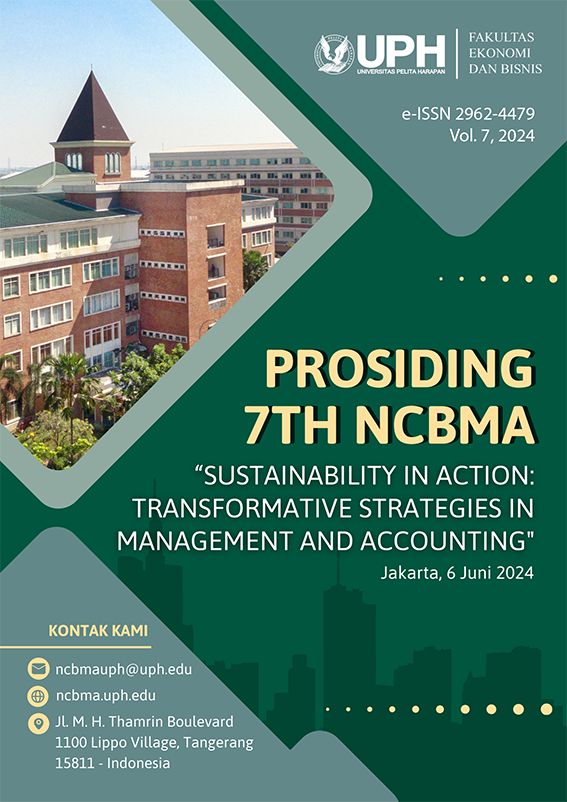COMPARATIVE ANALYSIS OF SUSTAINABILITY REPORTING QUALITY ON GRI STANDARDS
Keywords:
sustainability reports, comparative studies, GRIAbstract
The performance and success of a company is not only seen from a financial perspective, but also how the company can survive and manage resources sustainably. Therefore, companies need awareness of the importance of preparing sustainability reports as a basis for assessing company performance in non-financial terms. Guidelines for creating sustainability reports were prepared by the Global Reporting Initiative, which recently revised previous guidelines. This change in guidelines has only been implemented in the last two years, so further research is needed regarding its impact on the quality of sustainability reports. The data collection technique is carried out by analyzing the relevant documents, namely the company's sustainability report. Reports are analyzed based on predetermined indicators, and then classified in interval form so that they can be ranked based on the assessment compiled by NCSR in the ASRR assessment. It can be concluded from the research results that there were 107 changes in disclosure, which we then grouped into 11 sectors; the impact of changes in guidelines was most felt by the financial service company sector. Then the calculation results also show a change in the quality of sustainability reports from changing the GRI-G4 guidelines to GRI-Standards. These changes resulted in an increase in the report's quality rating from "Poor" to "Fair". This shows that the change in sustainability reporting guidelines from GRI-G4 to GRI-Standards has had a positive impact on the quality of sustainability reports. Changes in quality are progressive, so it is believed that the results obtained can improve if the research is carried out again in the next few years.References
Belal, A. (2012). Corporate Social Responsibility Reporting in Developing Country: The Case of Bangladesh. Hampshire: Ashgate Publishing Limited. Retrieved from https://books.google.co.id.
Boucher, M. & Rendtorff, J. (2016). Stakeholder Theory: A Model for Strategic Management. Switzerland: Springer Nature. Retrieved from https://books.google.co.id..
Fitrah, M. & Luthfiyah. (2017). Metodologi Penelitian: Penelitian Kualitatif, Tindakan Kelas & Studi Kasus. CV Jejak: Jawa Barat. Retrieved from https://books.google.co.id.
Freeman, R. dkk. (2010). Stakeholder Theory: The State of The Art. Cambridge: Cambridge University Press. Retrieved from https://books.google.co.id.
Gay, L.R. & Diehl, P.L. (1992). Research Methods for Business and. Management. MacMillan Publishing Company: New York. Retrieved from https://books.google.co.id.
Global Reporting Initiative (GRI). (2013). Sustainability Reporting Guidelines (versi GRI-G4 Bahasa Indonesia). Retrieved from http://www.globalreporting.org.
Global Reporting Initiative (GRI). (2016). Sustainability Reporting Guidelines (versi GRI-Standard Bahasa Indonesia). Retrieved from http://www.globalreporting.org.
Global Reporting Initiative. (2018). Sustainability Disclosure Database. Retrieved from https://www.globalreporting.org/SiteCollectionDocuments/GRI-Data-Legend-Sustainability-Disclosure-Database-Profiling.pdf .
Gunawan, J., (2015). Laporan Keberlanjutan: Prinsip Menentukan Isi dan Kualitas. Jakarta: Mitra Wacana Media.
Hadad, M., & Maftuchah, I. (2015). Sustainable Financing (Jakarta: PT Elex Media Komputindo). Retrieved from https://books.google.co.id .
Libby, T. & Throne, L. (2017). The Routledge Companion to Behavioural Accounting Research. London: Routledge. Retrieved from https://books.google.co.id.
National Center For Sustainability Reporting (NCSR). (2019). Asia Sustainability Reporting Rating 2019. Retrieved November 20, 2019, from https://www.ncsr-id.org.
Notoatmodjo, S. (2010). Metodologi Penelitian Kesehatan. Rineka Cipta: Jakarta.
Nurdin, I. & Hartati, S. (2019). Metodologi Penelitian Sosial. Media Sahabat Cendekia: Surabaya. Retrieved from https://books.google.co.id.
Porter, E.M. & Kramer, M.R. (2006). Strategy & Society: The Link Between Competitive Advantage and Corporate Social Responsibility. Massachusetts: Harvard Business Publishing. Retrieved from https://books.google.co.id.
Sudijono, A. (2010). Pengantar Statistik Pendidikan. Jakarta: PT. Raja Grafindo Persada. Retrieved from https://books.google.co.id.
Sugiyono. (2017). Metode Penelitian Kuantitatif Kualitatif dan R&D. Alfabeta: Bandung.
Wagiran. (2019). Metodologi Penelitian Pendidikan: Teori dan Implementasi. CV Budi Utama: Yogyakarta. Retrieved from https://books.google.co.id.
White, G.B. (2009). Sustainability Reporting: Managing for Wealth and Corporate Health. New York: Business Expert Press, LLC. Retrieved from https://books.google.co.id.
Downloads
Published
Issue
Section
License
Copyright (c) 2024 Wijaya Triwacananingrum, Andrea Azaria, Elizabeth Elizabeth, Giovani Novia

This work is licensed under a Creative Commons Attribution-ShareAlike 4.0 International License.

